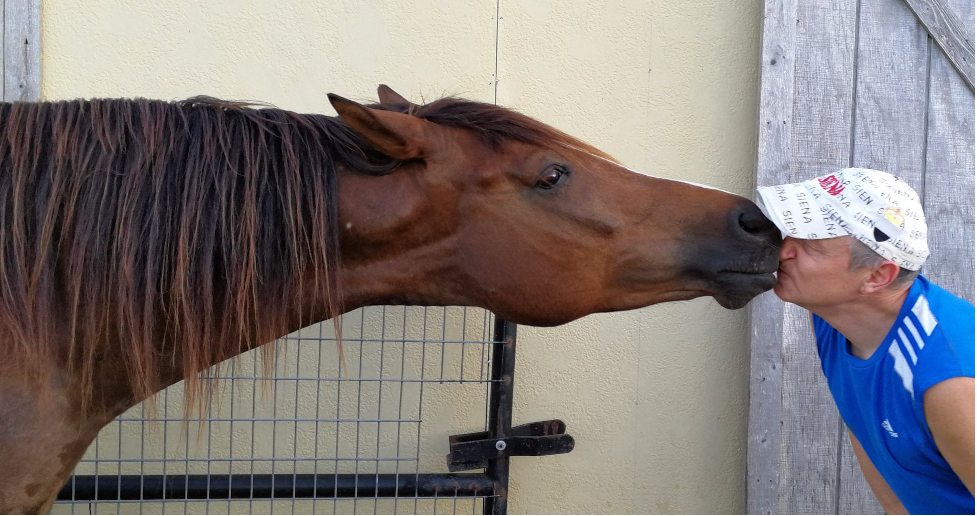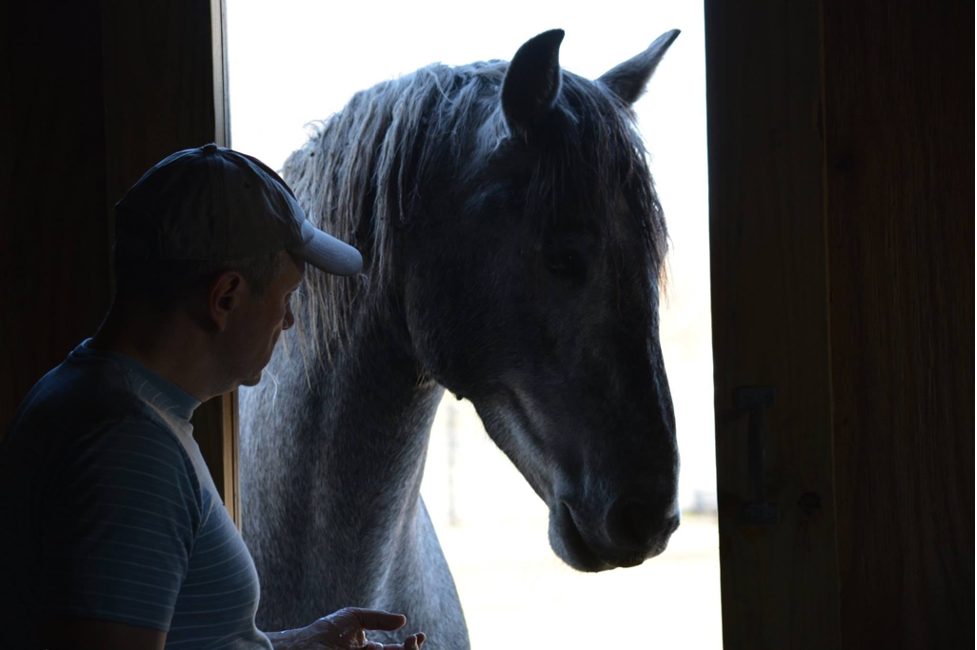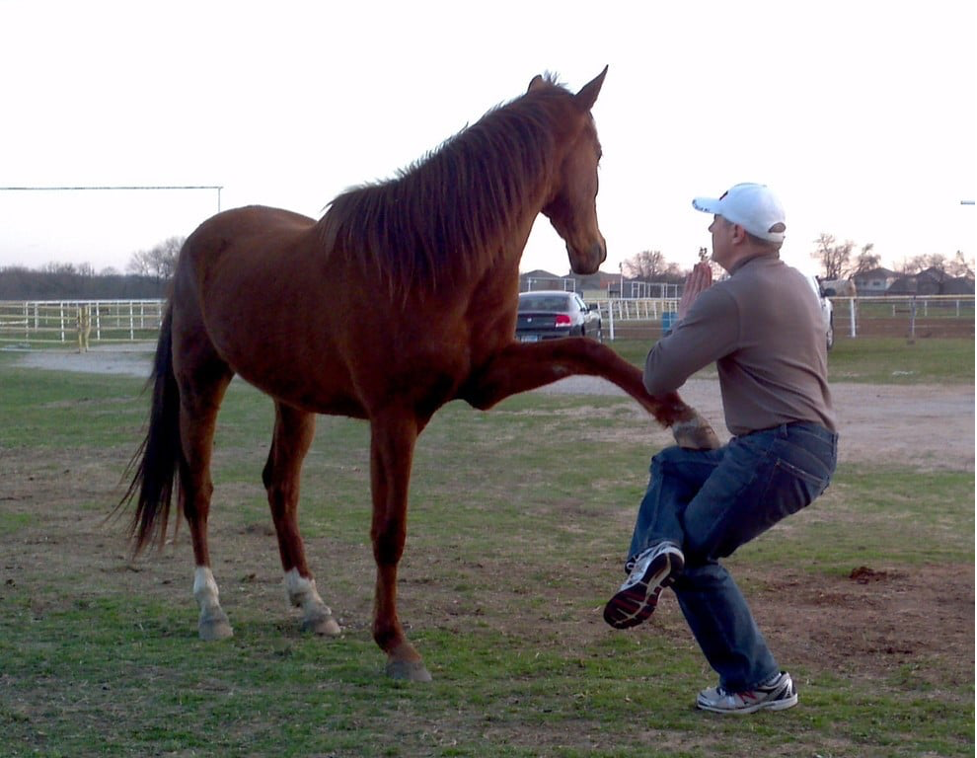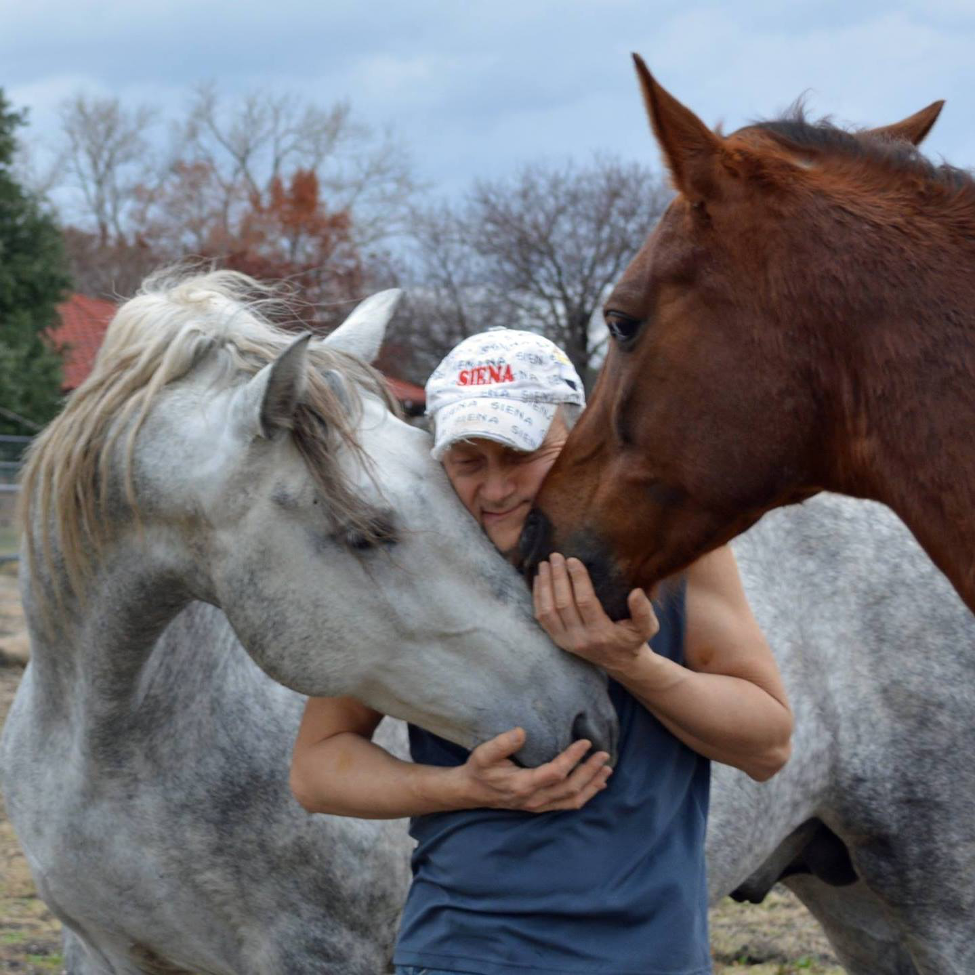by Edward Pershwitz, NHE representative, Texas
Let’s talk about the large and controversial topic “using treats,” which is a common phrase that a lot of people use.
Treats are not used – they are given. The whole notion of “using” treats presumes that they are a means to an end, not an end in themselves. Use them for what? To achieve what? And why? “Why” is the biggest question of them all. Why do I want whatever it is that treats can buy me? Compliance? Performance? Affection? If treats are not given freely, for the sole purpose of creating happiness, if they are a tool “used” to get what I want then our relationship is reduced to simple manipulation and the horse’s participation is reduced to primitive opportunism. This is an antithesis of Autonomous Horsemanship (AH) and Nevzorov Haute Ecole (NHE.)
I give treats liberally. My horses enjoy it and I like doing things for them that they enjoy.

A common sentiment is: “I want for the horse to be with me because of me, and not the food I provide.” This is probably one the most frequently brought up arguments against giving treats. If the human assumes a role of a “treat dispenser” the relationship is no longer a true friendship because the horse becomes only interested in treats and starts incessantly “begging” for them if they are not constantly given.
An interesting question to ask is not as much why they want to be with me but why do I care so much about their motivation? And if this isn’t my ego speaking, that I’m important in someone’s life, then what is it? Why do I care to be important in their lives instead of giving them a sense that they are important in mine? And how then do I give them that sense? By denying them something they would enjoy? And when they ask for it, label it as “begging” and consider this an undesirable behavior? How utterly backwards is this?
This also connects to the issue of empowerment. The horse is your property, possession, slave. Adored, loved, pampered (the human notion of it) but still a slave. Thinking of the impact of ownership on the relationship is a powerful tool to help understand our dynamics with the horses. Here’s a human analogy. Imagine that you are having Valentine’s dinner with someone you’re in love with and you decide not to bring flowers or chocolates to it because they are supposed to be there for you and not for the chocolates. And oh, by the way, you don’t have to worry about them being there or offering their bodies to satisfy your needs because you have this little nifty fence around them and they depend on you for every aspect of their existence. What a great way for them to be there for you and not the food, isn’t it? And then they say, I really, really, LOVE chocolates. And your response is, nope, I want you to be there for me, not the food, so why don’t you stop acting like a beggar and start loving me for real, would you?

Treats and Operant Conditioning
There are 2 forms of operant conditioning: reinforcement and punishment. Reinforcement encourages desirable behavior and punishment discourages undesirable behavior. Each can in turn be positive or negative. Positive introduces a stimulus into the operant’s environment and negative removes a stimulus from the operant’s environment.
This creates a “matrix” of four techniques. Positive reinforcement introduces something desirable into the operant’s environment to encourage desirable behavior (I’ll give you a carrot for a bow). Negative reinforcement removes something undesirable from the operant’s environment to encourage desired behavior (I will remove pressure if you comply). Positive punishment introduces something undesirable to discourage undesirable behavior (I will hit you if you bite me). Negative punishment removes something desirable from the operant’s environment to discourage undesirable behavior (I will stop
scratching you if you get too demanding).
It’s worth noting that any interaction with the outside world is a form of operant conditioning in a sense. We are all motivated by either getting something that we want or avoiding something that we don’t. And we learn things in the process. This is not necessarily bad. Where it becomes toxic is when it’s combined with the training mindset. And the training mindset is fed by our focus on achieving results. The way it relates to treats is in the context of positive reinforcement and negative punishment. If I’m working toward a result, an NHE element, for example, I might be tempted to reward my horse for putting his foot on a pedestal with a treat so that he gets the idea that this is what I’m asking for and does it next time in anticipation of another treat (positive reinforcement). I may also be tempted to withhold a treat he knows I have if he says no to the lesson so next time he’d be more motivated to participate (negative punishment).
Making giving treats conditional upon achieving a desired behavior is what destroys the relationship. Instead of engaging in a meaningful dialogue with the human the horse gets busy trying to figure out what else he needs to do to get a treat. It also introduces a form of control, “economic” rather than violent. You have to go to work to get paid. You have to do lessons to get treats. The relationship just slid down from a friendship to a “friendship with your boss” – have to please him to get a spot award.
Take away the training mindset, refocus on the process (of which treats may very well be a part), put the horse (rather than the result) first – and the problem goes away. If treats are given, or not given, regardless of the outcome, they become a part of a shared experience – an experience of giving and experiencing joy. And the result will take care of itself.
As usual, a human analogy makes things clearer. Is it okay to ask a child to dance for a cookie? Would it cross your mind to offer your lover ice cream for intimacy? In contrast, is there anything wrong with throwing a party to celebrate a child’s piano recital? Or with having a candlelight dinner with your lover filled with joy and good food and meaningful conversation, that later may lead to intimacy?

About Edward Pershwitz: My journey with horses started when I was 10 years old. First, the riding school, then showjumping, then training and working with “problem horses” using various forms of Natural Horsemanship, and then finally, a complete departure from any form of physical or psychological coercion of another living thing. This happened when my first horse Gunner came into my life 11 years ago as a 2.5-year-old colt and I became a student of NHE. Unlearning everything I had learned over decades of horsemanship and breaking every instinct I had as a horse trainer was an arduous process that ultimately led to a complete transformation of my understanding of horse/human relationships and ways to be with horses in general. The mutual education of a human and a horse has become a wonderous journey into a limitless realm of possibilities unrestricted by the notion of any particular achievement yet structured enough to provide a framework for self-development of all parties involved. This journey is ongoing. My two horses Gunner and Atticus, an NSH gelding and an Andalusian stallion, live with me and are my daily source of inspiration. Atticus came into my life as a 10- month-old baby almost 10 years ago and the three of us have been inseparable since.

Beautiful post and the human analogies just make it SO clear. Thank you!
This is a wonderful article addressing a very important topic that is plagued by mis-information, tradition and human-thinking. Kudos! I love the way you have explained treat-giving as a form of manipulation vs. an expression of love and appreciation. That said, there are a few important aspects/considerations I feel may not have been addressed in this article.
#1 is the unhealthy, but very common, human belief that horses would have no reason or motivation to be in relationship with us (or engage with us) without outside motivation (such as food rewards). This mindset does fall into the category of wanting to manipulate the horse’s choices, which the article does address, but this mindset is not so much an EGO-based manipulation, nor is it a desire to control the horse as an expression of “power over”. Rather, it is a self-depricating mindset based in low self-esteem and human feelings of unworthiness. Such as, “Why on Earth would a horse ever find me an interesting companion or friend? There must be something else in it for them, so I should offer treats.” I hope I’m explaining the difference in mindset here adequately. In my work with humans through my EAL program, I find widespread feelings of unworthiness to be the primary motivator behind any inquiry or request around feeding the horses treats.
#2 is that while high value, limited supply treats can 100% be enjoyable for the horse, the offering of such treats can also be quite stress inducing, especially in herd situations where the horses feel motivated to disregard one another’s personal space boundaries (or ours) in order to access the treats. It can also be very stressful for other nearby horses if they observe one horse receiving high-value treat rewards that they themselves do not have access to (due to fences or some other physical constraint). In my opinion, this type of scenario creates unnecessary stress and if we are (even unintentionally) causing unsettled feelings or stressed feelings in any of the horses (not just our own), then we are projecting OUR perception that receiving “chocolate”, so to speak, as a gift is pleasurable onto the horses without being conscious of the other layers of herd life involving balance, equity, fairness and autonomy that could be quite stress-inducing.
Thank you Kim for your notes to the article. I think that your first note is about EGO as well but a little different way. People are unable to understand their mistake when they think that the only correct answer is that horses are interested in them at the current moment.
Why do people feel hurt and worseless because horse is not not interested, and why do they think that treats will fix it? Why do we feel hurt when somebody who did not even decide to be with us, is not interested in us? It is again our ego speaking to us…. that I have to be worthy, I have to be loved by them. And treats are the form of control, how to take action to have it, use our control over rare resources to have our way instead of trying to understand why an animal enclosed in fence and totally dependent on us and his ability to communicate his needs to us still do not interact with us and seems totally uninterest. Of course we do that because that is what we learn. We address the consequence by treats without thinking about the root cause of his unnatural uninterest in interaction with someone who is in charge of everything he needs. Of course when you have the horse at home, it is different then when you come once a day for limited time and your only offering is you and your time, but you can still have power to clean water, refill forage, take horse outside on meadow or help him with insect, scratch itchy places, put stone from hoof. To me it is rather inability to listen to the horse and inability to break thinking that the horse is there for you instead of you are here for the horse. Most horses behave that way because people do not bring anything good into their life except resources and do not listen when they try to express their concern, they are offended by horses using their hooves, teeths and press of their body. The problem about interactions from people is that they are about them, not about the horse. Even that feeling of being worthless is about them, not about the horse, so why should the horse be interested in someone who is interested only in himself and is not present at all. People are not present because they still think about themself, to be worthy, to be a good owner, to be loved, have an obedient horse, be successful, have a good ride, be in charge, win competition….. They do not get anywhere with this type of thinking, especially with a horse who was abused by people in order to satisfy their ambitions.
I know how this feeling of worthless too, when I started my journey with NHE, I had such type of horse, Maaike was very obedient, but very uninterested horse, she did everything not because she wanted to please me, but she knew that the faster people get what they want, the faster they disappear. So no surprise that when I allowed Maaike to say NO and have her way, I ended up sitting in the pasture, watching an uninterested horse who did not even come to me. It hurt, I traveled one hour to her and one hour back to just be with her for one hour, I did not have any other free time after school and work and she did not even come to say hello to me. When I brought treats, she ate them and left. And my first thought was what if it is this way forever? Does it even have some meaning for her if I am here, would it be better for both of us if I just let her be and do not come often? There is a way from this, but people need to put away his hurt ego and disappointment because of course he imagined it a different way when he bought a horse and put such a huge responsibility on himself. You need to be present and think the way, you are here for your horse, not your horse for you and do not pity yourself.
Thank you for highlighting the herd situation and treats. When you give treats, you should give them to all horses. I always give treats to both my mares. Edward does the same, he has Treat time for boys when they come (or sometimes he chases them with treats) and get treats. If you just give treats to only one horse while the other has to watch, you create stress.
I am now doing an article from a little different point of view than Edward and it is about what treats do to us. I address here how people tend to use them for various reasons as a shortcuts instead of thinking about the cause of the problem and that treats often spoil our work and interaction rather than make us successful because things seem to be easy with them for us, too easy. We often overlook the reason for horse behavior in an attempt to overwrite their responses with treats.
Thank you so much for addressing this additional layer, and acknowledging that even the feelings of being “unworthy” are a manifestation of ego. “It’s all about us”. I, too, have been through the experience of horses wanting nothing to do with me because of past trauma… and it is always true that as long as we “want” these traumatized horses to want to be with us, they will feel our “needy” intention and stay away. A big part of what I teach is to view the horses with empathy, regardless of what they (the horses) choose to do (or not do). It is all okay and our own happiness or sense of fulfillment must not be dependent on what the horse does or does not do in relation to us. Of course, once we learn to truly let these feelings and wants/needs go, everything shifts. Also, I have learned to have a different appreciation for what it means for a horse to “be with” us or “interact” with us. This can happen energetically from a good distance. Proximity is not necessarily an indicator of whether or not a horse is feeling connected with us, and participating in two-way conversation.
I am excited for the article you are writing about treats from the human perspective (what they do to us). I think this is a CRITICAL exploration and understanding. Thank you!!
Freud once said, “Sometimes, a cigar is just a cigar.” Sometimes, a treat is just a treat. I think it’s important to note that in any domesticated setting, there are only going to be degrees of autonomy for horses. As long as horses are confined in any way, shape, or form, there is going to be some degree of human manipulation or, if you prefer, influence. I remember once having a boss at work who brought me the truffles that American Airlines gave him whenever he flew. He would stride into the office and deposit the box of two truffles on my desk with a huge smile on his face. I think it delighted him more to give them to me than I was delighted at receiving them. He remains to this day one of my favorite people. I personally would rather see someone “use” treats than a crop with a horse. NHE is very exclusive in that having a horse at home is the ideal, and obviously affords people with those financial resources to own a property the ability to spend much more time with their horses. As someone who boards her horse and has done so for the past 14 years, I do use treats to catch King when I need to quickly halter him for a vet appointment so my vet doesn’t sit around waiting for me to catch my horse. Other times, I show up the way my old boss did and offer a treat just because it’s fun and I know King enjoys them. It’s delightful to do little things that please the other beings in your life “just because.” Perhaps there’s an opportunity to consider treats and their place in a relationship with a horse situationally. Sometimes, a treat can be a tool. Sometimes, a treat can be a love offering. Sometimes, a treat can just be a treat.
Monica, Kim, Lucie — all fascinating, thoughtful and wonderful postings on the subject (and related areas); thank you all so much.
Like many others, I used to ride (although always gently and respectfully). After studying Frederic Pignon and Mr. Nevzorov, I stopped riding. Of course, I am nearly 70 now, but age alone was not the reason. I decided that it was healthier and better for my horses — two Thoroughbreds, and that the best life I could offer them was to have ‘little to no agenda at all’. If I arrive at the barn, and they decide not to come into see me, I just leave some treats, However, as I have ‘almost no agenda’, other than a few fitness exercises (in-hand), a few times per week, I find they usually trot or canter in to see me.
It’s not always for treats. They enjoy massage, quiet time together, and they seem to enjoy the company of humans as well as other horses. Even if they don’t come in on some days, or if they leave after a while, and return to pasture (they can come and go from the barn as they please), it is always their choice.
The horses that are often ridden tend to run off and do not wish to be caught. Some feed in a bucket or treats are the methods employed to catch the horses. They don’t wish to be with their riders, in many instances (not all, certainly).
You discuss ‘being present’. Ah! Now that’s an important subject. Unfortunately I see many younger riders who are rarely present, constantly checking cell phones or talking to one another, as though they are mounted on exercise machines.
However, even in some of the ‘liberty work’, I see aggression from the humans and forcing the horse in liberty training. That’s no better — perhaps it’s worse.
We hand-walk our horses for a few miles, every other day, but only if they walk out with ears forward and seem to desire walks. I always look at their expressions — if they seem tired, not on form, etc., then we don’t do anything and we just spend time with them in the barn or in the pasture.
Many forget that horses have bad days, just as we do. We have to let them say no, sometimes. Then, let it go.
I recently adopted an Off-Track Thoroughbred, aged 8 from a rescue/rehab organization.
This horse has been through one or two years of abuse (we don’t have all the details) and
ended up in the kill pen at an auction. He is now in good health, although he has some damage. They are blessed species, all of them. That he should even try to trust a human
again after all he has been through (we know some of the story…) is almost heartbreaking.
Does he receive treats? Yes, certainly. As much hay as he desires, rubs, massage, affection,
and no stress beyond what may be unavoidable in a
boarding situation. And he walks beside me and follows only at a voice invitation, with no lead or halter, and often no treats. He knows there is no agenda and he has a choice.
They read us much better than we think.
Thank you all for terrific posts. Keep up the great work.
Nuala